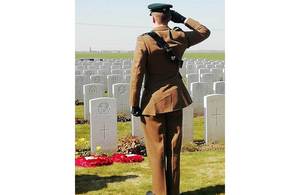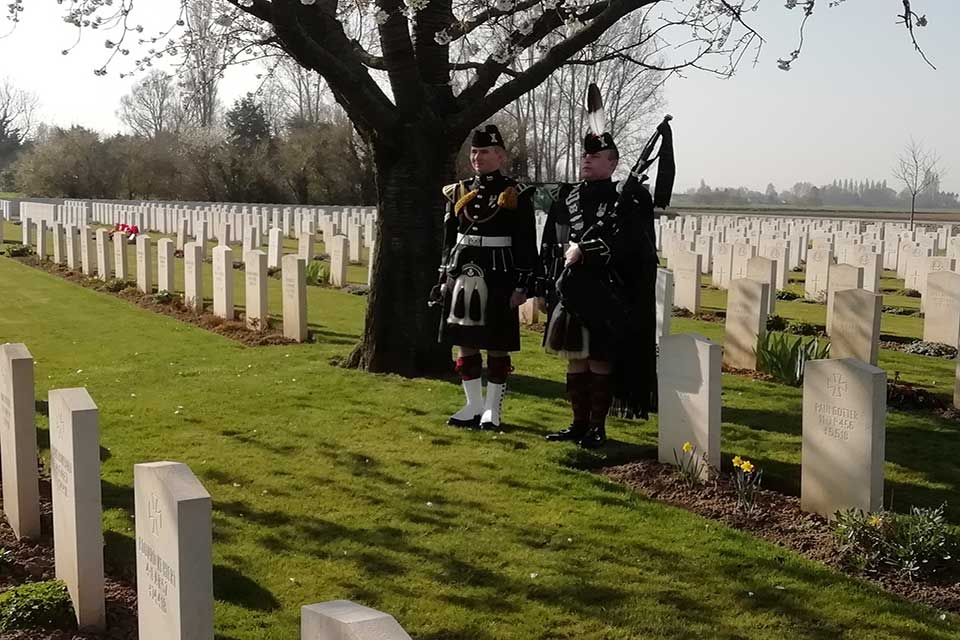Graves of Five Great War Soldiers Rededicated
The final resting places of five soldiers killed in World War One have been identified, and Services of Re-dedication have taken place at their graves in northern France over the last two days (22 and 23 March).

An officer salutes at the grave of Company Serjeant Major Bax
The services were organised by the MOD’s Joint Casualty and Compassionate Centre (JCCC), also known as the ‘MOD War Detectives’, and were held at various Commonwealth War Graves Commission (CWGC) cemeteries in France.
Louise Dorr, from MOD JCCC said:
“It’s wonderful that thanks to two of our regular researchers we have been able to confirm their findings and return these soldiers’ names to them.
“Although some of their families live overseas and have been unable to attend, each of them is well represented by their military family on behalf of a grateful nation. I’m honoured to have been able to be here to rededicate their final resting places.”
The Reverend Andrew Grant, Chaplain to 4 Scots, conducted the services.

A Piper and a bugler prepare to play at the re-dedication service for Corporal Thayne
Details of the soldiers identified are as follows:
Corporal (Cpl) William Lionel Court
The 1911 Census shows William at age 24 serving with the 1st Cavalry Brigade, 19th Hussars at Wellington Lines, Aldershot, Hampshire. He died on 8 August 1918 (aged 31) while serving with the 19th Royal Hussars (Queen Alexandra’s Own).
Cpl Court’s remains were originally found just south of a small wood to the east of Guillaucourt, although he was not identified at the time. He was buried as a “Soldier of the Great War – Unknown Corporal – 19th Royal Hussars”.
Cpl Alexander Mayes Thayne
Cpl Alexander Mayes Thayne was killed on 10 April 1917 (age 27) while serving with the 2nd Dragoons (Royal Scots Greys). His battalion’s war diary tells us that early that morning the Royal Scots Greys arrived in the village of Wailly, near Arras, before joining up with other regiments of the 5th Cavalry Brigade to make contact with other British units in the vicinity. Early that evening, the Royal Scots Greys moved on toward Wancourt and took up positions in shell holes on low ground. They stayed there throughout the night, although they were subject to periodical German artillery fire.
Second Lieutenant David Bell
Second Lieutenant David Bell was serving with the 13th (Scottish Horse) Bn. Black Watch (Royal Highlanders) when he was killed in action on 7 October 1918 (age 36). The war diary tells us that his battalion was in the vicinity of Gouy on the day he died, and it mentions his death specifically. The burial records tell us that the remains were originally recovered from the western slopes of Prospect Hill, close to the French village of Gouy.
Company Quartermaster Serjeant Charles John Niven
Company Quartermaster Serjeant Charles John Niven was serving with the 6th Gordon Highlanders when he was killed in action near Neuve Chapelle on 13 March 1915 (age 27). We now know that he is the unknown Staff Sergeant of the 6th Gordon Highlanders buried in a grave at Pont-du-Hem Military Cemetery.
Company Serjeant Major (CSM) William Henry Bax
CSM William Bax was a career soldier, having attested into the Regular Army on 1 July 1906 as a private soldier. He served with the 6th battalion and A Coy, 2nd battalion in France and Flanders. He died on 24 March 1918 (age 29) while serving with the 2nd Battalion Oxfordshire and Buckinghamshire Light Infantry.
CWGC Commemorations Officer, David Royle, said:
“It’s an honour to have hosted these Services of Rededication at our sites across France this week. We thank the dedicated efforts of many in helping us to identify these five brave men. It is our privilege to care for their graves in perpetuity.”